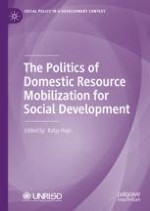2020 | OriginalPaper | Buchkapitel
9. Domestic Resource Mobilization for Social Development in Bolivia (1985–2014): Protests, Hydrocarbons and a New State Project
verfasst von : Verónica Paz Arauco
Erschienen in: The Politics of Domestic Resource Mobilization for Social Development
Aktivieren Sie unsere intelligente Suche, um passende Fachinhalte oder Patente zu finden.
Wählen Sie Textabschnitte aus um mit Künstlicher Intelligenz passenden Patente zu finden. powered by
Markieren Sie Textabschnitte, um KI-gestützt weitere passende Inhalte zu finden. powered by
